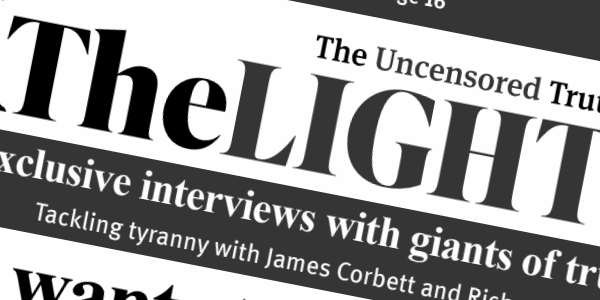RECENTLY I had just delivered a pile of The Light newspapers to a shopkeeper, ‘Janet’, who displays them on her counter for customers to take, when an elderly woman came in. As soon as she caught sight of the papers she erupted in sheer fury. ‘What on earth are you doing promoting that awful paper?’ she demanded of Janet. ‘It’s nothing but conspiracy theories! It says that the vaccine is killing people! It is dangerous in the extreme. It’s evil and vile and makes out that governments are bad and are knowingly harming people.’ She uttered much else besides and with each exhortation she worked herself up further into a sorry state. ‘I’ll never set foot in this shop again,’ were her parting words as she stomped out.
Janet, somewhat shell-shocked at this outpouring, didn’t say a word in reply. She had previously told me that one or two customers had said they didn’t like the paper (to which she had replied: ‘Well, you don’t need to read it, then’) but it didn’t take long for her monthly batch to be taken by enthusiastic readers. She had never seen this customer before and had never encountered this level of hostility.
I made an instant decision to leave the shop and catch up with the woman, as I could see she was distressed. In my most sympathetic and concerned demeanour (genuinely felt) I asked if she was ok. She began to regale me with the same vitriolic invective she had been using in the shop. Over the years I’ve learned that the only way to deal with people who are so hyped up is to let them vent their feelings, be patient and not be in any way argumentative or confrontational. Letting people talk themselves out is the only way they will calm down and then, perhaps, you can converse with them on an even keel.
After some minutes she was beginning to settle down. She asked me if I had read The Light and if I had what did I think of it. I’ve been in similar positions before and have gradually realised that rather than an absolute defence of the paper and presenting a counter-argument, a more subtle and thoughtful response is always more productive.
‘I have seen this paper before,’ I replied, ‘and yes, it definitely does present alternative views to the mainstream. My own opinion is that “truth” is a slippery business in the modern world and I don’t know whether we can expect the truth from any source. Do you think we get the truth from the mainstream media?’ Her reply to this was interesting: ‘There’s no doubt the media exaggerate and mislead us to some extent.’ She told me about her position as a local politician, her involvement in the decisions made over the last four years and how it hadn’t been easy. I realised why she had been so upset.
Now we were getting on to common ground. Job losses, businesses closing, the choice between heat and eat, constant wars and fearmongering, the insecurity and anxiety of modern life, particularly for the young, NHS waiting lists, technology leaving millions behind and much else besides. I suggested that in view of the aforementioned it might not be a surprise that more people were prepared to consider ‘conspiracy theories’ as their lives had been so seriously impacted, while those who were super-wealthy seemed to benefit more and more. She certainly didn’t disagree with this. I must have chatted to her for 15 minutes and we were certainly on the same page regarding most things.
I brought the conversation to a conclusion and we parted with a handshake. My softly, softly approach may have planted a seed: who knows? But it is, in my opinion, the only way of dealing with people who cannot comprehend an alternative to that in which they have been indoctrinated.
As TCW has reported, on December 4, Andrew Bridgen co-ordinated and chaired a presentation at Portcullis House: ‘An address by doctors and scientists regarding the Covid pandemic and its consequences’.
Sixteen MPs attended and most seemed genuinely startled to hear the facts as presented. How, Ian Paisley asked, would MPs such as he manage public fear once his constituents were made aware of the truth imparted to them?
How indeed? And is it now the case that most MPs are simply too afraid to contemplate the truth, fearing the repercussions when the public finally find out the extent of the harms they have been subjected to?
The woman I spoke to had been instrumental in the enforcement of covid policies. However, she impressed me with her decency and her sincere belief that what she was doing was right. This is what I mean when I say ‘good people do bad things’. They do it out of ignorance and a lack of basic research, possibly because they have been systematised for so long.
Perhaps this goes some way to explain the anger shown by this woman when seeing the newspaper. Maybe deep down her conscience was pricked and the revelation of what might be true was too much for her. When the truth is established, there will be an awful lot of soul-searching and I do believe there will be very many people who will find it extremely difficult, if not impossible, to come to terms with their actions over the covid years. Many of us will need to be compassionate, understanding and forgiving, but considering the harms done, particularly if we have been directly affected, will we be up to the task?

